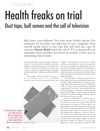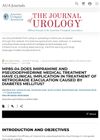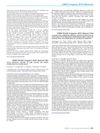 15 citations,
January 2017 in “Advances in Experimental Medicine and Biology”
15 citations,
January 2017 in “Advances in Experimental Medicine and Biology” 5α-Reductase inhibitors can negatively affect male sexual function and, in some cases, significantly reduce sperm count, but these effects may be reversible.
 August 2015 in “Dermatologica Sinica”
August 2015 in “Dermatologica Sinica” Men with severe hair loss may have poorer sperm quality.
 8 citations,
January 2017 in “Fertility and Sterility”
8 citations,
January 2017 in “Fertility and Sterility” Urologic diseases and treatments in older men can negatively affect fertility, and doctors should talk to patients about this.
 11 citations,
March 2010 in “International Journal of Andrology”
11 citations,
March 2010 in “International Journal of Andrology” Finasteride 1-mg doesn't harm sperm or pregnancy chances.
 October 2023 in “Toxicology and Applied Pharmacology”
October 2023 in “Toxicology and Applied Pharmacology” Finasteride is more harmful to male reproductive health than minoxidil.
January 2021 in “대한본초학회지(본초분과학회지)” ECS may help treat hair loss by promoting hair cell growth.

A mix of Polygonatum sibiricum and Nelumbinis semen may ease menopause symptoms with fewer side effects.
 April 2014 in “Significance”
April 2014 in “Significance” Unconventional home remedies can sometimes show surprising results.
 7 citations,
March 2021 in “Evidence-based Complementary and Alternative Medicine”
7 citations,
March 2021 in “Evidence-based Complementary and Alternative Medicine” Nelumbinis Semen extract helps hair grow and could prevent hair loss.
 15 citations,
September 2014 in “JAMA Dermatology”
15 citations,
September 2014 in “JAMA Dermatology”  1 citations,
May 2023 in “Fertility and sterility”
1 citations,
May 2023 in “Fertility and sterility” Men who went through puberty later had lower sperm counts and altered hormone levels, possibly affecting fertility.
 October 2010 in “Journal of Men's Health”
October 2010 in “Journal of Men's Health” Larger prostate size in older men may be linked to poorer semen quality and fertility issues.
 198 citations,
April 2020 in “Journal of Endocrinological Investigation”
198 citations,
April 2020 in “Journal of Endocrinological Investigation” The virus was not found in the semen and urine of a man who tested positive for COVID-19.
 1 citations,
September 2013 in “Fertility and Sterility”
1 citations,
September 2013 in “Fertility and Sterility” Finasteride may improve sperm count in subfertile men with low sperm count.
 April 2017 in “Reactions Weekly”
April 2017 in “Reactions Weekly” Finasteride may cause weak ejaculation and reduced semen volume.
 2 citations,
October 2000 in “The Journal of Urology”
2 citations,
October 2000 in “The Journal of Urology” Finasteride daily doesn't affect sperm production or semen in young men.

Some drugs can reduce male semen quality.
 2 citations,
October 2017 in “Drug safety - case reports”
2 citations,
October 2017 in “Drug safety - case reports” Finasteride for hair loss may cause painless bleeding in urine and semen.
2 citations,
October 1999 in “The Journal of Urology”  December 2023 in “Urogenital tract infection”
December 2023 in “Urogenital tract infection” Seminal bacteria can lower sperm quality in subfertile men.
 February 2024 in “The Journal of Sexual Medicine”
February 2024 in “The Journal of Sexual Medicine” 5-α reductase inhibitors do not significantly affect male reproductive function but may reduce semen volume.
 104 citations,
May 2019 in “F1000Research”
104 citations,
May 2019 in “F1000Research” Losing weight, fixing varicoceles, and using advanced sperm selection methods improve male infertility treatment outcomes.
 April 2018 in “The Journal of Urology”
April 2018 in “The Journal of Urology” Imipramine and pseudoephedrine treatment can effectively restore normal ejaculation in patients with diabetes, increasing their chances for pregnancy.
 36 citations,
February 2011 in “Fertility and Sterility”
36 citations,
February 2011 in “Fertility and Sterility” Finasteride use may cause sperm damage and infertility, stopping it can improve sperm health.
 October 2010 in “Journal of Men's Health”
October 2010 in “Journal of Men's Health” Some patients may experience lasting sexual dysfunction, depression, and other side effects from 5α-reductase inhibitor therapy.
3 citations,
January 2003 SPELA 707, a mix of eight herbal extracts, may help treat hair loss by activating hair growth and increasing hair density.
 August 2024 in “The Journal of Urology”
August 2024 in “The Journal of Urology” The 2024 guideline updates recommendations for genetic testing, imaging, and sperm retrieval in male infertility.
 March 2024 in “The journal of sexual medicine”
March 2024 in “The journal of sexual medicine” The therapies improved ejaculation disorders and sexual function in middle-aged men.
 March 2013 in “Reactions Weekly”
March 2013 in “Reactions Weekly” A man's fertility improved after he stopped taking finasteride but worsened again when he restarted the medication.
June 2021 in “European Urology”


























